After five long months, Mark Thomas is moving out of his mum’s and looking ahead. In the final episode of his coronavirus podcast, Mark asks his nightly network of health and care workers how they’re feeling about the future. They share their hopes and fears as autumn approaches, talking candidly about everything from promising new treatments and technology, to mental health crises, second surges, capacity and space.
What lies ahead
Hosted by Mark Thomassound by Helen Atkinsonproduced by Nicolas Kentproduced by Susan McNicholasphotography by Franklyn Rodgers
- Podcast
- Serial
Listen
Speaker 1: Hello?
Speaker 2: How have you been? You all right?
Speaker 1: Yep, no problem.
Speaker 3: Oh, hello. Oh my goodness!
Speaker 4: Yeah, of course, that's fine.
Speaker 5: No, that's fine. Hello, yes.
Mark Thomas: Hello and welcome to ‘Mark Thomas’s lockdown check-up’, the podcast that talks to health and care workers about their lives and work throughout the COVID-19 pandemic. If you have joined me before, you will know that I moved into my 85-year-old mum’s two-bedroom flat in south London at the start of lockdown, five long months ago.
My mum has had other members of the family come to live with her for short periods of time. I know this because the spare room has lines scratched into the wall with a nail, and one of the posters conceals a hole that leads to the sewers, though I should say I have thoroughly enjoyed my stay being narrated by Morgan Freeman.
Look, I will be the first to admit that it is hard to share a small space with a grumpy, sweary loudmouth, especially for a lavender-scented being such as myself. It is hard being in lockdown with anyone, especially when that anyone is someone and that someone is a parent, in which case it’s like being trapped in a really long Philip Larkin poem. As with all parents, they are infuriating, as are their offspring, because we know each other too well.
Mark’s mum: I don’t like being told what to do. That really annoys me, that niggles me. And he knows it, so it’s a button he can push hard on, you see.
Mark Thomas: It is true that I get on her nerves. It’s also true that for some mornings, just for light relief, I try and see how long it takes me to get her to tell me to depart the premises using words of no more than four letters. It’s quicker than you might think. And once we had to call in the Greenwich Observatory and use a strontium atomic clock. She was asked if she liked sharing her space with me and she replied:
Mark’s mum: Not something I would really recommend. I mean, he tries hard. He really does try sometimes. Sometimes he’s very trying as well.
Mark Thomas: I am really trying. I do swear. I am provocative on occasion. I am annoying, and self-centred, and rude, and I have a penchant for singing music-hall songs and Victorian melodies first thing in the morning, but I am doing the best with the genes I was given. And if you detect an affected tone, it’s because I’m moving out of my mum’s flat. Five months have passed, the door is open, the ankle bracelet attached, and Tooting High Street is lined with yellow ribbons.
I can put my hand on my heart, though, and honestly say that my time here has been a minor living hell, but one that I wouldn’t have missed for the world.
Now, I don’t want to reflect too much on the past, especially as it feels like we are both setting off on our new paths. So, in this, our last episode, I wanted to look at the future.
As you should know, if you followed the podcast chronologically – and frankly, if you haven’t, you’re jumping in at a point that might seem unexpectedly abrasive towards my mum – but as regulars know, I spend my evenings talking to health and care workers, phoning them and chatting through their lives.
I wanted to know what they thought and felt about the future, having lived and worked through this first part of the pandemic. George is a consultant geriatrician in a major trauma unit, and I started by asking him what he thought our chances were if COVID-19 returned and surged as it did in April. What I wanted to know was what was going to be better this time round.
George: Now we know more about the disease itself, and the way it works, and the way it affects people, we’re much more capable of looking after people better, I think. A lot of the mortality that we’ve seen is from blood clots, and we didn’t really start using blood-thinning medication with big doses until quite late on in the pandemic, and I think we could now prevent mortality better with that. And now we developed the new dexamethasone treatment that will help also.
Mark Thomas: The various struggles and endurances of human endeavour have often produced unexpected outcomes, some of which have proved to be quite the bonus. The space race, for example, gave us superglue. The arms race gave us really cool peace badges.
When I talked to George back in April, he had told me how he was concerned about junior doctors coming on the rounds with him. So when I caught up with him recently, he was understandably excited to tell me about a new piece of kit he had.
George: We were trialling this Microsoft HoloLens device, which is a hologram, basically, and you wear these goggles, and it’s got a shield in front of your eyes that’s see-through, and it projects images on to it. And so we’re able to project the X-ray images, the blood tests, we can scroll through the structured notes on the computer. And so we’ve been able to do ward rounds with this device on with no one else on the ward round with us on the COVID ward. And at the same time, we can speak to the patient, and then speak to the junior doctors who are in the meeting room behind, who’ve got all the information in front of them, and do our ward round remotely. And so that’s been pretty cool.
Mark Thomas: All major medical crises force us to adapt and improve medicine. I’m not suggesting that virologists and epidemiologists sit around reading the paper and playing pool, waiting for the emergency klaxon to sound before doing any work, like lazy superheroes. No, I am merely saying that necessity is the mother of invention. So with a highly contagious virus, the NHS has found virtual ways to run consultations, to interact at a distance, a skill my mum and I have yet to develop. However, just because you can do something technically, doesn’t mean it works for everybody. Jackie is a GP in east London, and she wonders on the impact on technology for her practice.
Jackie: I’ve always been a face-to-face consulter. Yeah, it’s actually fine to consult remotely, but it can’t be that way for everybody. I think that has long-term implications for the doctor-patient relationship if we continue to work like that, because I think an awful lot of the relationships and the trust that we’ve got with our patients, and the long-term relationships have enabled us to manage like this for now, but I don’t know that we’d successfully be able to do it long term.
Mark Thomas: My family have proved time and time again that ignorance on a subject doesn’t mean we are without opinion, an unusual trait for humans at this time in our existence. As my mum says, “The trouble with you is I’m always right,” and she occasionally is.
Mark’s mum: I’m not saying the vaccine is the be-all and end-all, it’s the start, but they’ve got to get that vaccine. And the thing is people don’t realise how much goes into these things, and they’ve got to be tested, and tested, and tested. You can’t just go out there and shove it in everybody. It’s not going to be done overnight.
Mark Thomas: This is also a view expressed by Max, a haematologist who I’ve spoken to throughout this pandemic.
Max: I think one thing that’s managed to become relatively unscathed during this period is perhaps trust in the medical profession. I don’t see too many people getting angry with nurses, doctors, physiotherapists, pharmacists at the moment, but I think that would potentially be a risk if the vaccine was offered very early.
Mark Thomas: My mum used to be a nurse. She trained as a midwife and worked in Glasgow and London, and like many nurses, she makes a terrible patient. She wants to know what’s going on, who’s going to do it, why they haven’t done something else, are they sure they’ve got the right dose? Have they got any more? She behaves like a nosy neighbour unto her own body. She is also acutely aware of her own mortality and gives me regular reminders of her wishes not to be resuscitated, though she expresses it with a tad more Irene Handl.
Mark’s mum: No, I just want to go quickly. I don’t want all this pushing and shoving, resuscitation and that.
Mark Thomas: I rather like the idea of the sum total of medical knowledge being reduced to pushing and shoving, but I guess once you get past a certain age, all medical procedure is like starting a knackered car. You push, you shove, you put some gas in, fire the jump leads, and see what goes.
My mum’s fear of hospital and doctors certainly keeps her, in her own words, from “being a burden”, but one of the terrible casualties of COVID-19 has been that many of the most vulnerable patients have been kept out of hospital. This is Tam, who works as a geneticist in Glasgow in laboratories that test for cancer.
Tam: I noticed that there’s been tens of thousands of procedures that have been cancelled because of COVID, and they’re still waiting to get done. So this is a wee sobering thought for you. I spoke to one of the haematology consultants who I knew, and we deal with leukaemia patients quite a lot, because we can get a rapid diagnosis for leukaemia, especially kids, rapid diagnosis, and they can get treatment within 24 and 48 hours, and it will save their life, but a lot of these people are probably dead or have died in the past five months because they can’t get to hospital.
Mark Thomas: In my unhumble opinion, ‘Stay at Home, Protect the NHS, Save Lives’ could have been translated into ‘Stay at Home, Protect the Government, Save Cummings’. And I’m fairly certain that many cartoonists in fact said that, but one of the government’s proud boasts in a litany of vainglorious failures is that the NHS was not overwhelmed, which is true, but keeping hospitals clear for COVID-19 has come with a price. Siobhan is head of nursing in a London hospital. She picks up where Tam left off.
Siobhan: I think about 60,000 people would have been referred in Guy’s and St Thomas’s through that period for cancer, for throat, for all sorts of specialist treatment. And basically that just completely fell off the target. So there’s that cohort people that have been halted. And then there’s people that are waiting for heart surgeries, there’s people that have gone on living in pain, waiting for joint replacement, there’s people with diabetes that they think have really, probably done a lot of damage that will then reach its way out that their sugars haven’t been managed.
Mark Thomas: Mental health has often been described as the Cinderella service, poorly provided for and largely ignored. For the network of people I spoke to involved in mental health, nearly everyone described the coming mental health crisis as a tsunami. However, it is not just the increase in numbers of people affected by mental health issues that is the problem, as Amrit, a consultant psychiatrist working in west London, explains.
Amrit: Drug and alcohol use has gone through the roof, and we’re really seeing that in A & E. We’re seeing high levels of disturbance, psychosis has gone through the roof, I’m finding that people are getting iller quicker, but then there’s a group of people who wouldn’t have hit secondary care. They would have been managed in the community by the GP, or just managed within their peer group, and that’s all disappeared. I’ve been struck by how quickly people with no previous illness have just fallen off the edge of a cliff.
Mark Thomas: One of the questions I’ve found myself asking over and over again is how do we cope? How do I cope with my mum? How does she cope with me? Especially as I have a penchant for starting the day by wandering around the flat in boxers and T-shirt, and this is not a flat to wander in. Essentially you could do the hokey-cokey and turn around, and have explored the entire place from top to bottom. It is small wonder my mum said:
Mark’s mum: Oh, but the doctor said I could die within ten years; you could die within ten minutes, Mark. Get out.
Mark Thomas: Thinking about the future, I asked Max how he might cope, and what his feelings were at the prospect of another surge in COVID-19.
Max: I think I wouldn’t have a choice. I mean I’d have to, and I think most people would feel the same. I think we’re all exhausted, we’re all a bit fed up, a lot of us are a bit depressed. These all pale into comparison really for what our patients have gone through, what people have gone through, but I think if a lot of the health professionals went through it again, we’d have no choice, and we’d do it, but it would have a significant toll, I’m sure, as it already has.
Mark Thomas: Getting through was the mantra of the first surge, and it looks set to be that for the second, too. Get through and count the cost later. This is Siobhan, head of nursing, again, when I asked her if we were better prepared.
Siobhan: I think we’re just seeing all the cards that are coming into the game to be played. And to be honest, do I think we’ve got the capacity and the ability to get organised and be ready? Probably not. I think we will somehow get through it, because we were going to come out the other side, that’s going to happen. And I guess how many people get broken and lost along the way will be determined as we go.
Mark Thomas: Throughout this series I have heard how NHS and care-home staff are exhausted from their efforts. For some, there is a feeling that the endurance of working in the pandemic is a turning point. Sophie is a nurse from Liverpool who regular listeners will know by now.
Sophie: I think I will change roles from it. I don’t think I’ll stay where I am. I think I will move to somewhere more clinical for my last few years. I don’t think I’ll stay in this job, because I guess it does make you realise that life is too short when people are dying like that.
Mark Thomas: At this moment, in what could turn out to be the lull before the second surge, it is not surprising that people are taking time to reflect. Naomi works in a care home, and after her experiences, she is fearful for the sector she works in.
Naomi: I am a bit nervous. Our business could potentially become quite unviable quite quickly. Our nursing staff have already had their hours cut. Care homes cross private, public sectors, so some care homes are charities, some are businesses, some are part of social care. And so it’s quite hard to knit it all together and figure out how to protect this patchwork of places and people. We were struggling for qualified nurses. Somehow we just should have been offered ... Any NHS staff should have been able to be shared. NHS nurses would have been proud to have come help struggling care homes. They wouldn’t have minded, but we were invisible at that point, so we’re not quite sure what our status is. So we’re a little bit flying by the seat of our pants.
Mark Thomas: Some people think we have a law of unintended consequences. I prefer to think of it as that we have a god of unintended consequences. The god of unintended consequences has had a field day during this pandemic. Who would have predicted that so much home-made banana bread would be inflicted upon so many by so few? Who could have predicted a year ago that we would be having family calls using Zoom, or that getting everyone to sit on a sofa and look at the other family would be so bloody difficult? The god of unintended consequences has not always been so glib, though. Jules is a dementia nurse, and she talks about the struggle families face, dealing with dementia during lockdown.
Jules: Speaking to my colleagues, it’s just such a real struggle for people with dementia and their families who are living at home. And I don’t actually know how that’s going to change, because actually the social connections that people have had have been so important, actually having a day centre or having a dementia café have just provided vital connections for families, and I think with those gone, as they are at the moment because of social distancing, it’s become really, really difficult for families. I think we’re seeing a lot more probably safeguarding issues, a lot more crisis situations, with families not being able to manage any more, and it’s brought things to a head much quicker than it would have otherwise. So I would say we are seeing more people potentially going into care homes than would be otherwise. And I don’t know how that changes.
Mark Thomas: Some things are entirely and somewhat despairingly predictable. When the prime minister, at the start of the virus said, “I’ve been shaking hands with everyone,” you could almost hear the virus laughing in anticipation. The government’s incentive for the NHS to get back up to speed is predictably punitive. It has a predictable outcome too. Siobhan, the head of nursing who you heard earlier, explains what the effect will be on her NHS Trust hospital.
Siobhan: We are back up. I think now we’re at about 60, maybe 65 per cent going into September of activity from out-turn last year. Well, that’s what they said to the NHS. “If you don’t get back to your targets, and if you don’t get back to 90 per cent by October, there will be financial penalties.” So you’ll get a fine. In an organisation, I think we’re £30 million adrift so far in this year today. Where do we pay a fine? Doesn’t that just mean we have one less person working at the efforts because we have to sack someone or make someone redundant? Which makes our total effort to make the problem better even diminish further.
Mark Thomas: Tam, the Glasgow geneticist who manages a lab that tests for cancer, has been all too aware of the consequences of shutting down large parts of the NHS to cope with COVID-19.
Tam: If we reach another pandemic level 5 just now, it’s going to do the exact same thing, and it’s going to knock back cancer patients, and people with serious illnesses another year, another 18 months, that’s a doomsday scenario as far as I’m concerned. And it’s basically down to the number of beds, and the number of ICUs, because we don’t have enough per head of the population. So I’m quite worried about the future, if I’m honest with you.
Mark Thomas: Asif is a consultant in a major trauma unit, and I met him a few years ago when I shadowed him for a night shift. When I spoke to him recently, I asked him about winter.
Asif: No, let’s not talk about winter. Last winter was bad enough. I think what we’re planning for is an even worse winter, because once flu starts, if you’ve got flu, you need to be isolated. If you have COVID, you need to be isolated. So now the problem is for us is that you need even more isolation space now, but space is still a huge issue. I think it will be worse. It will be a bit of a difficult issue this winter.
Mark Thomas: Space and capacity is what it comes down to. This is Siobhan again.
Siobhan: There is no more hospital space. There are no more staff. You can only do what you can do. And those finite resources are just not enough to cope with what is demanded of society on the NHS today.
Mark Thomas: I think it is one of the really big questions, not just for the NHS, but for all of us, which is about where does the health service find that extra capacity, the slack that it needs to absorb influxes? Asif and his hospital, as usual, have been creative in that quest of finding space.
Asif: So they’re now looking at trying to repurpose areas of the hospital that were being used for something else, because they’re trying to look at, because less people are having face-to-face outpatient clinics. Can we repurpose areas, to offload some of the demand in A & E? What they’re looking at in different areas, they’re looking at where our surgical outpatients used to be and they’re trying to turn it increasingly into what’s called an ambulatory unit.
Mark Thomas: It seems that every winter the NHS worries about capacity, and with a pandemic and the flu gathering forces on the horizon, the debate about space has started in earnest, but I am not the only one who has noticed that we had a Nightingale hospital up and running pretty quickly, and versions of it all over the country, too. Tam in Glasgow is one of many of the network I talk with to take up this idea.
Tam: You mentioned the Nightingale hospitals. So the equivalent up here in Glasgow at the SECC is the Louisa Jordan hospital. And that never treated any COVID patients at all because the NHS coped with it, but they’re keeping it open, and they’re going to use it for operations and surgery and procedures. So that’s a good idea. And that’s been funded by Scottish government. So that’s a positive. So that will help with backlogs and things like that. And they’ve brought in equipment already and staff. Good news, but we haven’t met this wall of work that’s coming our way yet. It’s on its way.
Mark Thomas: Despite the fears and the worries, the stresses and the exhaustion, I have been constantly amazed at how the people I talk to each night frankly just turn up for work the next day, let alone having the determination to do the right thing to be cleaned and to prepare.
Ruth is a local authority public health officer. And when I asked her how she felt about a second surge, and if she was frightened of it, she told me she had trained for 12 years, and that this is what she did. So I asked her what would she want to see as a response to any new surge?
Ruth: I’m hoping that the next phase will be one of boldness and of really getting out there and testing, and making sure people isolate, and that if we need to close a school, we do until we get everyone well. So I’m really hoping it will be a ... I would much rather be taking it on, if that makes sense, and overcoming it. I want us to be really bold and say, “No, we’ve got this disease. We’re not going to let it affect anybody else.” I think we can do it.
Mark Thomas: And so my time is done. It is time to pack up my bags and sprawled piles of books and notes. I get ready to leave home at the tender age of 57. No more will I sleep in the white-walled monk’s cell. I turn my gaze for the last time from the cabinet of ceramic clowns. I cast one final look in bewilderment at a miniature portrait of Napoleon that hangs above the clock – I have no idea why. And I say goodbye to the woman who has called me jailer, and the warden, and the governor. I say goodbye to the person who scorns green food and has spent quite a lot of a time in lockdown literally poking me with a walking stick.
I have learned many things in my time with my mum in lockdown, including that the word ‘kale’ can be used as an insult, but the most significant thing I have learned is that it helps to see ageing not as a foreign land but as our future selves. And if the pandemic does have a second surge this winter, we have to look after each other, we have to trust the health and care workers, because having talked to them all this time, they really are worth trusting, and also it’s all we’ve got. As always, the final word goes to my mum.
Mark’s mum: That’s what I keep saying to my friend, we’ve got good family. They are a pain in the backside sometimes, but they mean well, even if they don’t all get on together. Or is that only my family that does things like that?
Mark Thomas: As always, thank you for listening. Thanks to the health and care workers who gave up their time to speak to me. Thanks to the Imperial Group of NHS hospitals. And thanks especially to my mum.
‘Mark Thomas’s lockdown check-up’ was recorded, written and presented by Mark Thomas. The sound editor was Helen Atkinson. The producers were Nicolas Kent and Susan McNicholas. And the podcast was commissioned by Wellcome Collection.
Speaker 1: All the best Mark, take care.
Speaker 2: Thanks for the free therapy.
Speaker 4: Give your mum a hug from me as well.
Speaker 3: Okey doke, take care, bye.
Speaker 5: And you mate, see you soon.
Speaker 6: Really nice to talk to you, and look after your mum.
About the contributors
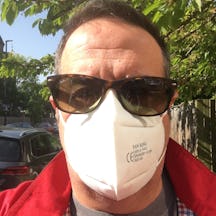
Mark Thomas
Mark Thomas has been a writer and performer for 35 years.
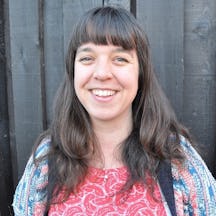
Helen Atkinson
Helen Atkinson is a sound designer working in theatre and live events. Helen has collaborated with Mark Thomas on a number of live shows including ‘Bravo Figaro!’, ‘Cuckooed’ and ‘Mark Thomas’ Check-Up – Our NHS@70’.
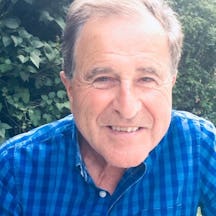
Nicolas Kent
Nicolas Kent was the Director of the Tricycle Theatre in London for 28 years. His political pieces there included: ‘Half the Picture’, ‘The Colour of Justice (The Stephen Lawrence Inquiry)’, ’Nuremberg’, ‘Srebrenica’, ‘Guantanamo’ (nominated for an Olivier award) ‘The Riots’ (2012) and ‘Bloody Sunday’ (Olivier Award for Special Achievement). In 2009, he directed the nine-hour trilogy ‘The Great Game – Afghanistan’ in London, New York and Washington. In 2016 he directed ‘Another World’ at the National Theatre and in 2017 ‘Mark Thomas’ Check-Up – Our NHS@70’. He has also directed productions in the West End, at the RSC, the Royal Court, and on and off-Broadway.
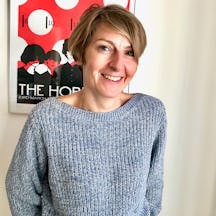
Susan McNicholas
Susan has worked with Mark Thomas for nearly 20 years. She is currently unemployable.
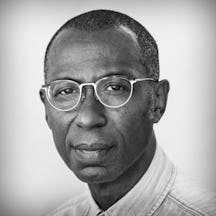
Franklyn Rodgers
Franklyn Rodgers is an artist and creative director whose work explores innovative approaches to re-examining the portrait in contemporary visual culture. His work not only investigates portraiture through narrative, content and context, but also how their placement can open new dialogues in challenging the idea of representation within the language of photography. He has exhibited internationally and his work is held in the permanent collections of the National Portrait Gallery, Tate Britain, Lloyds of London, Welcome Collection, Autograph, Queen Mary University of London and Arts Council England.